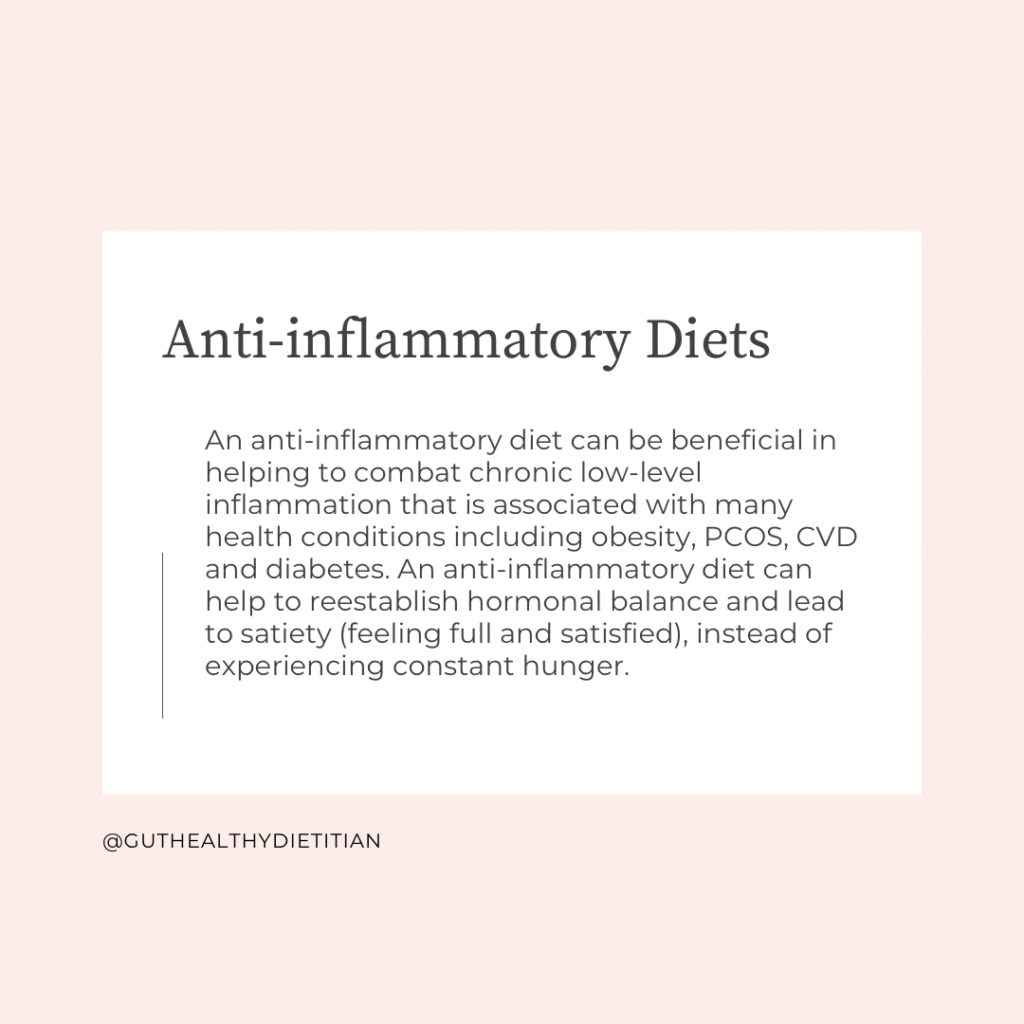
Anti-Inflammatory Diet Recommendations
One of my favourite topics…anti-inflammatory diets! I incorporate an anti-inflammatory approach with many of my clients to help combat the low level inflammation that is associated with many chronic diseases. However, I see a ton of misinformation and misleading product claims around anti-inflammatory diets, so I wanted to set the record straight.
An anti-inflammatory diet can help to combat chronic low-level inflammation that is associated with many health conditions including obesity, PCOS, CVD and diabetes. The foundation of an anti-inflammatory diet is high intake of omega-3 fatty acids and polyphenols (a type of beneficial plant chemical or antioxidant). An anti-inflammatory diet can help to reestablish hormonal balance and lead to satiety (feeling full and satisfied), instead of experiencing constant hunger and cravings.
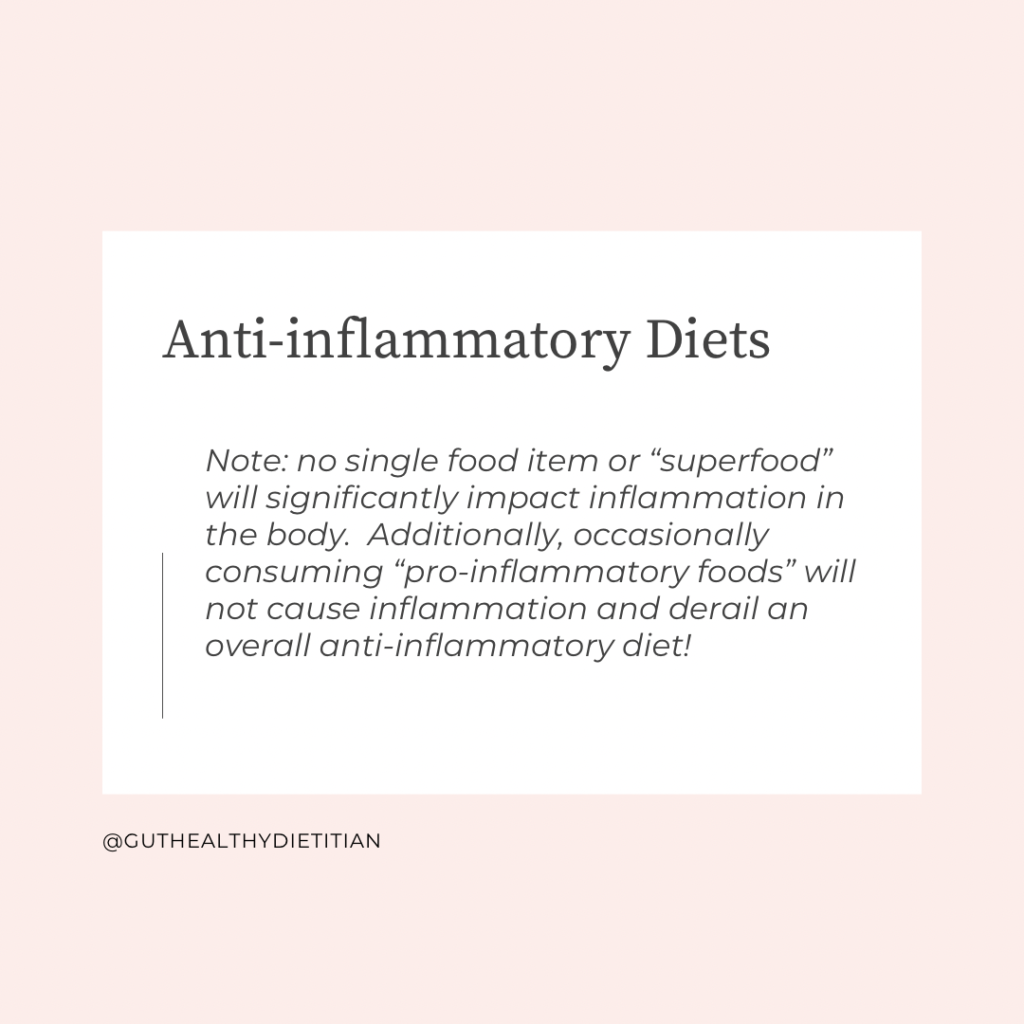
Foundations of an Anti-Inflammatory Diet:
- A diet rich in colorful, nonstarchy vegetables contributes adequate amounts of polyphenols to reduce inflammation.
- Inclusion of omega-3 fatty acids, which may include supplementation
- An anti-inflammatory diet is high in fiber and antioxidants, and low in pro-inflammatory foods such as red meat, added sugars and processed foods.
- Diets high in fat, particularly saturated fat, have been associated with increased inflammation and weight gain and therefore saturated fat intake should be reduced.
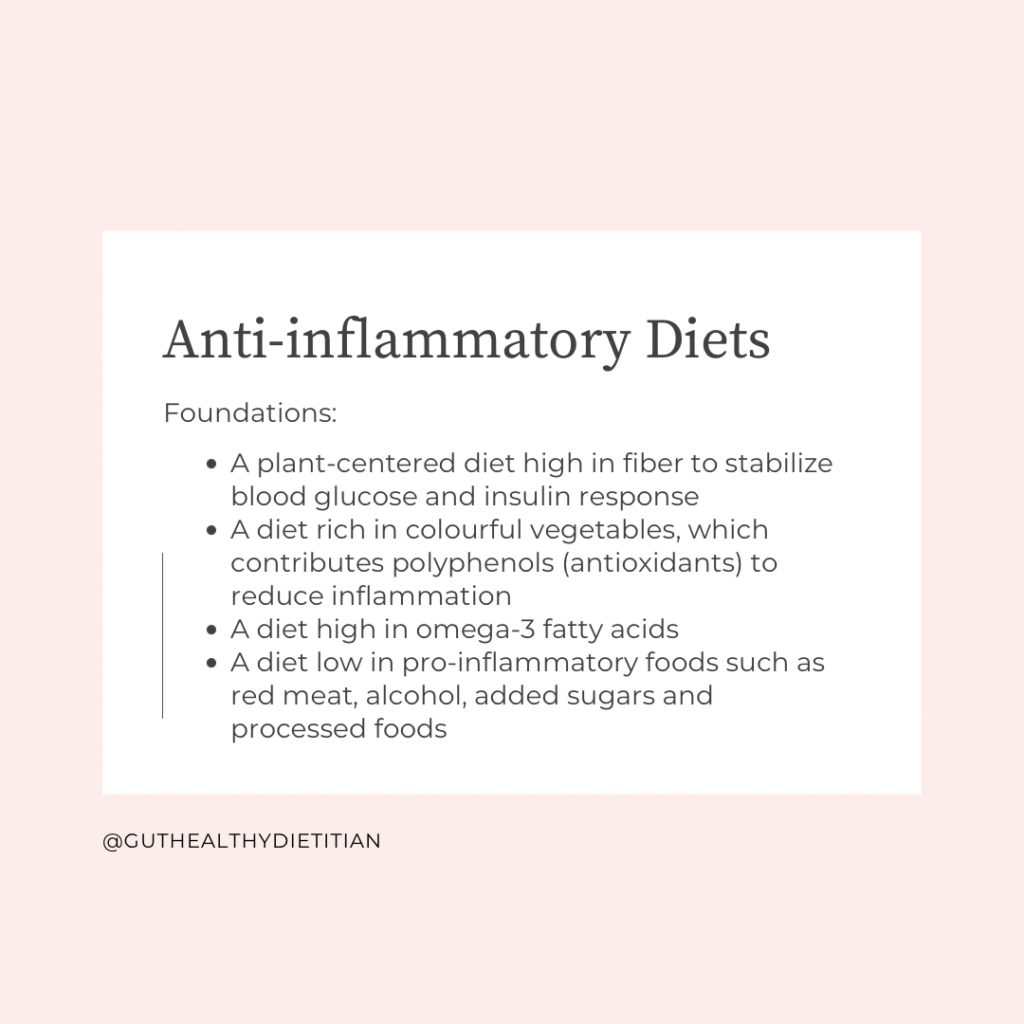
Anti-Inflammatory Diets and Gut Health:
▪️An abundant and diverse gut microbiota is associated with positive health benefits and lower long-term weight gain.
▪️An association also exists between low bacterial richness and increased low-grade inflammation and weight gain over time.
Essentially, gut health refers to an abundant (lots of bacteria) and diverse (lots of different types of bacteria) gut microbiome. And how do we promote gut health? Primarily through eating a plant-focused high fiber diet containing plenty of prebiotic and fermented foods.
Other considerations:
- Consider adding a prebiotic supplement such as inulin, which has been associated with reduced inflammation and improved satiety and weight loss. Inulin feeds Bifidobacterium, a healthy bacteria that is associated with reduced levels of inflammation!
- A probiotic supplement may be beneficial as well in certain cases, although probiotics have only demonstrated significant benefit in certain populations (i.e. IBS).
Recommended Foods (Anti-Inflammatory):
- Fruits
- Vegetables
- Whole grains
- Beans and Legumes
- Nuts and seeds
- Polyphenols (see list below)
- Tumeric
- Omega-3 fatty acids (salmon, tuna, walnuts, algae, hemp hearts, ground flaxseed)
- Avocados
- Garlic
- Extra virgin olive oil
- Cocoa powder
- Ginger
- Green tea
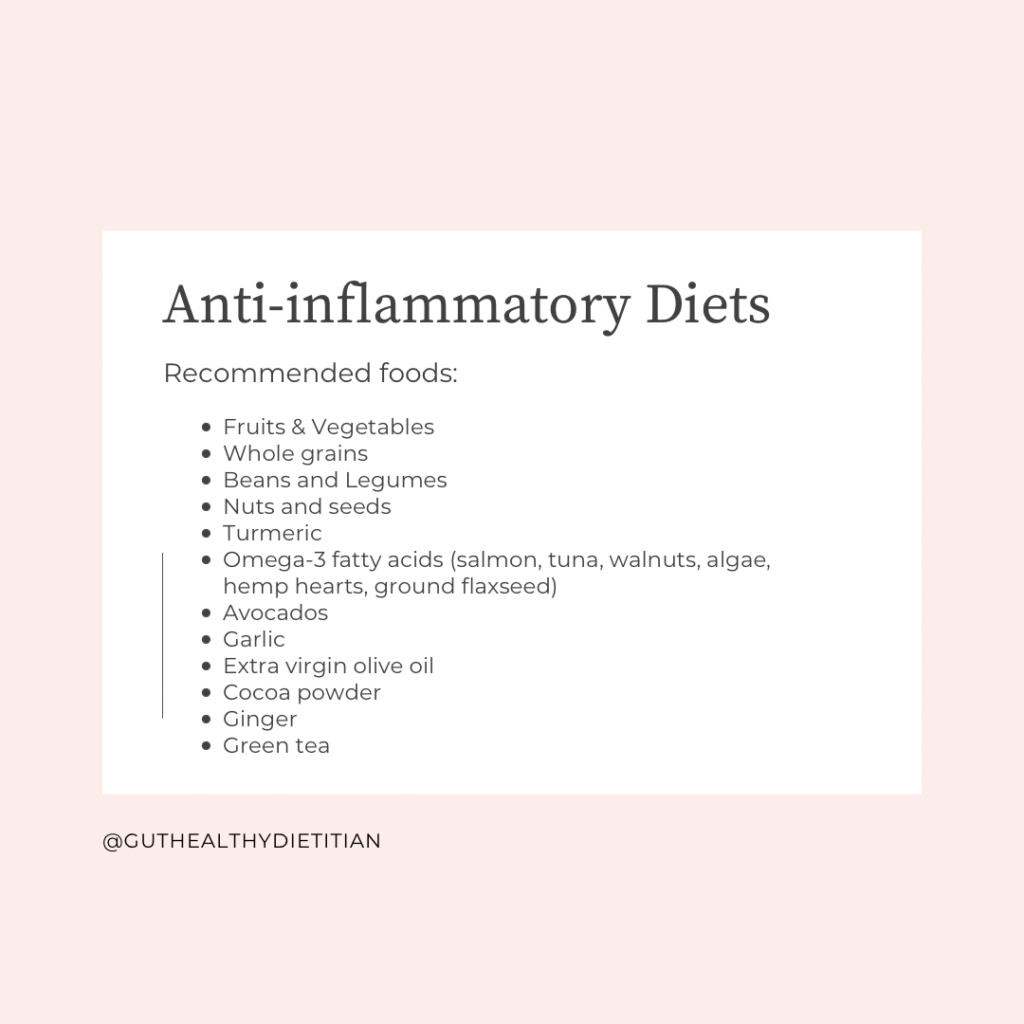
Foods to Limit (Pro-Inflammatory):
- Red meat
- Processed foods
- Processed meat
- Sugar, high fructose corn syrup
- Trans fats
- Refined carbohydrates
- Alcohol
- Certain vegetable oils
- Saturated fats
- The following foods are common allergens and therefore are potentially inflammatory IF you have an allergy/intolerance: dairy, eggs, soy, gluten
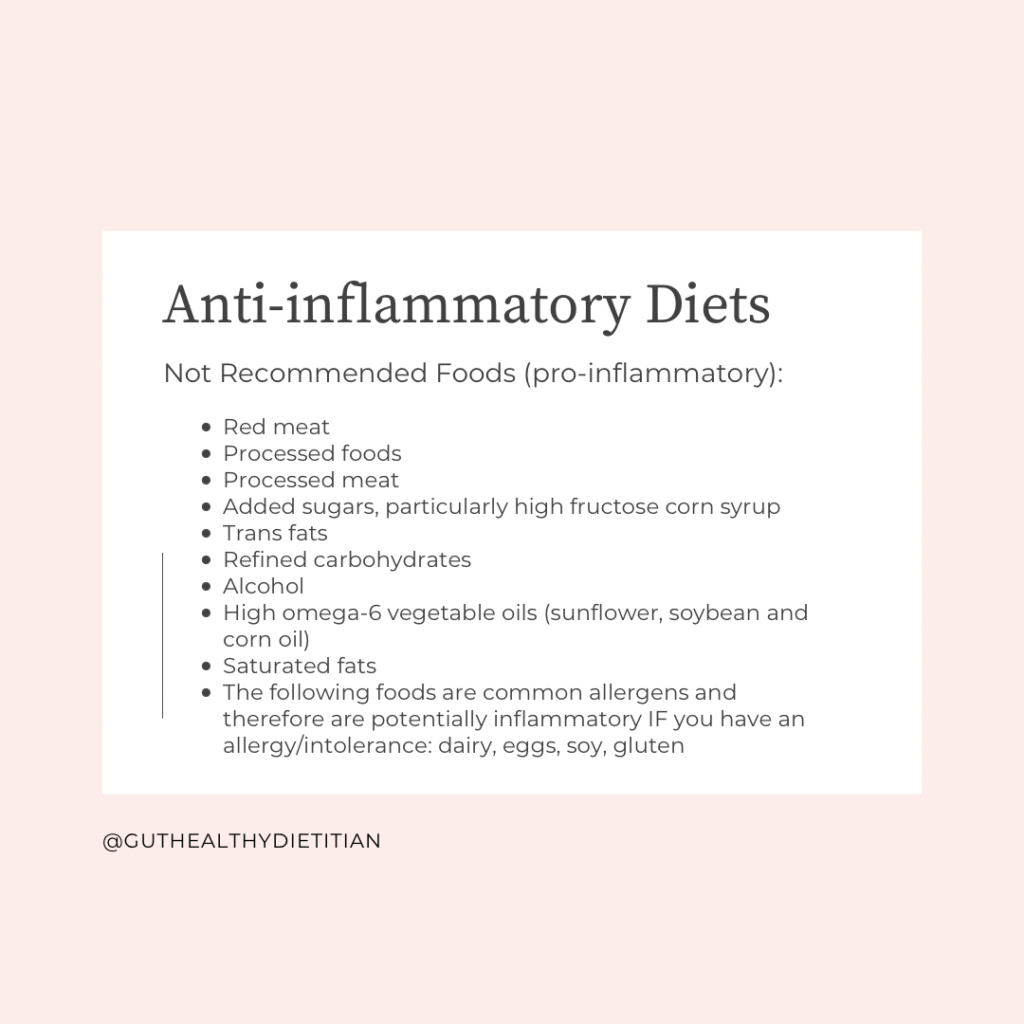
Nutrition Supplements to Consider:
Consider working with a Registered Dietitian who is experienced in anti-inflammatory diets to determine whether nutrient supplementation is beneficial for you, and at what dose!
- Omega-3 Fatty Acids
- Inulin: a prebiotic that is associated with reducing inflammation and weight, as well as improving glucose balance. Most significantly, inulin supplementation influences the production of gut hormones such as GLP-1, PYY and ghrelin, which impact appetite regulation and GI motility.
- Prebiotic foods: jerusalem artichoke, garlic, onions, leeks, asparagus, bananas, barley, oats, apples, cocoa, flaxseeds, wheat bran
Polyphenols:
Polyphenols are a type of beneficial plant chemical (phytochemical) that provide antioxidants and other health benefits.
Benefits:
- Promote the growth of beneficial gut bacteria (prebiotic-effect)
- Blood sugar control
- Anti-inflammatory effects
- Improve depression
- Limit oxidative damage (associated with degenerative disease and ageing)
Food Sources:
- Red wine
- Cocoa powder and dark chocolate
- Tea & Coffee
- Fruits (especially berries, plums, cherries and apples)
- Beans, Nuts, Soy
- Vegetables (especially artichokes, chicory, onions and spinach)
Importance of Omega-3 Fatty Acids
Omega-3 fatty acids are a type of polyunsaturated fat and essential fatty acid, meaning that our body does not make them and therefore we must consume them in our diets. Unlike other fats, omega-3 fatty acids are biologically active and have important roles in processes such as inflammation and blood clotting. Unfortunately, consumption of omega-3s in most North American diets is very low despite it’s established benefits in cardiovascular disease and combating inflammation.
The three main omega-3 fatty acids are ALA, DHA and EPA. ALA is mostly found in plant sources, whereas EPA and DHA are mostly found in animal foods. ALA is the most common source of omega-3’s in your diet, however, it needs to be converted into EPA or DHA before it can be utilized by the body. Unfortunately, the conversion process is very inefficient – less than 10% is converted! ALA that is not converted to EPA or DHA is stored or used as energy like other fats. You may want to consider an DHA/EPA supplement (algae) if you are plant-based.
Food Sources of Omega-3’s:
- Fatty fish (such as salmon, mackerel, sardines) *DHA/EPA
- Algae *DHA/EPA
- Walnuts *ALA
- Flaxseeds *ALA
- Pumpkin seeds *ALA
- Hemp hearts *ALA



Leave a Reply